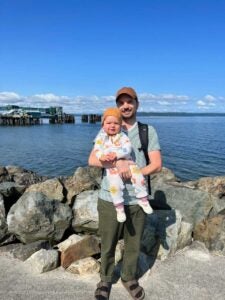Fatherhood has always meant more than just providing – it’s about presence, patience, and the everyday moments that shape a child’s world. Over time, the idea of what it means to be a dad has evolved, moving beyond outdated expectations toward something more meaningful: emotional connection, active involvement, and shared responsibility.
Attitudes have changed. So have time commitments. But policies? Many haven’t kept up. Only roughly half of the world’s countries offer any form of paternity leave – and when they do, it’s often just a week or two.
Where public policy falls short, companies have an opportunity – and a responsibility – to lead. At SentinelOne, we aim to meet that moment with 16 weeks of paid, gender-neutral parental leave, real flexibility, and a culture that recognizes our Sentinels as people first.
This Father’s Day, we’re proud to share the stories of four dads across SentinelOne who are helping to redefine modern fatherhood, navigating trade-offs, embracing joy, and proving that care at home and performance at work aren’t in conflict, but deeply connected.
Atul Kumar, Senior Manager, Go to Market Systems, Delhi, India
The son of two police officers, husband to a teacher, and the first in his family to pursue a career in tech rather than government service, Atul Kumar joined SentinelOne just over three years ago. A father to five-year-old twins, Pavika and Parnika – strikingly different in every way but appearance – he has carried the bulk of household caregiving since the day they were born.
“It was during the height of the pandemic,” Atul recalled. “My whole family of frontline workers was out in the field overseeing vaccination drives and other public health efforts, and I was the only one at home. I was doing everything: feeding them, bathing them, putting them to sleep. I was with them from early morning until late at night.”
Even after the pandemic eased, Atul remained closely involved in his daughters’ lives – not because he had to, but because he wanted to.
“I love taking care of them,” he said. “I usually handle the morning routine so my wife can go to work, and I get the girls ready for school. Then I come back home and start my day.”
His work schedule, he added, looks different from that of many of his peers.
“Most of my friends are done by five or six in the evening,” he said. “I start in the afternoon and work until late. Since SentinelOne is a global company, it actually works better for me. I get more overlap with colleagues in other time zones, and our conversations tend to be more effective.”
His decision to take on so much at home raised a few eyebrows at first.
“For generations, there’s been this unspoken expectation that caregiving is a mother’s role and fathers are supposed to earn,” Atul said. “Nobody in my family has ever done what I’m doing, so I wasn’t sure if I should be doing it either. It felt a little awkward at first.”
That uncertainty didn’t last.
“Now, I’m my daughters’ favorite person,” he added with a smile. “That kind of trust, that unconditional love, makes me very proud.”
Atul believes cultural expectations are shifting, and he credits companies like SentinelOne with helping move the needle.
“I think workplaces like this one are significantly accelerating the change,” he said. “Four months of paid parental leave is offered here, and it applies to dads too. I’ve been in tech for 14 years. I have friends with 20 or 30 years of experience, and none of them have ever seen that before.”
When he first read the benefits policy, he had to stop and read it again.
“For a moment, I thought it was a typo,” he said, laughing.
But, it’s not just the company’s values or its parental leave policies that matter to him. Atul was recently awarded additional stock units through SentinelOne’s internal rewards program — support that, he says, made a meaningful difference for his family.
“That really impacted me, not just as an employee, but as a parent,” he said. “It came at a time when I was deciding which school to send my daughters to. The one I liked most had about 30 percent higher fees than the others nearby, and I wasn’t sure if I should commit. When the stock units arrived, I had this feeling that this is what they’re for. For me, it was SentinelOne enabling me to give my children a better education. And I’ll always be grateful for that.”
Mikuláš Zelinka, Staff Software Engineer, Prague, Czech Republic
A second-generation computer scientist, Mikuláš Zelinka is continuing the family’s tradition with three young sons who may one day follow in his footsteps, just as he followed in his father’s. Matěj, Vojta, and Honzík are four, two, and just under a year old.
“Matěj came to me the other day and said he wanted to be a programmer like me,” Mikuláš said with a smile. “I’m constantly amazed by how closely they observe the world around them. Even my work calls and team meetings don’t go unnoticed. Every now and then, they pop in to say hello to my colleagues and it always lifts the mood.”
Balancing a career with raising three children is no small task, but Mikuláš always knew he wanted to do both.
“When I was looking for a new job two years ago, one of my non-negotiables was a solid parental leave policy, so I could spend time with our new baby when he arrived,” he said. “Thinking about how I’d divide my time between work and family was a key part of the decision.”
He ultimately chose SentinelOne, and he’s been with the company ever since.
“I plan to use the rest of my parental leave over the summer,” he said. “The great thing is that you don’t have to take it all at once, and I still have six weeks left.”
Mikuláš works in a hybrid model at the company’s Prague office, splitting his time between home and the workplace.
“My wife enjoys staying home with the kids, so I wouldn’t need to be the primary caretaker,” he said. “But, I do enjoy combining both roles. I like the change of scenery, so to speak, and it can even help me stay sharp and refocus when I’m stuck solving a difficult problem. Also, there’s always something completely different to look forward to, which is great.”
Of course, it doesn’t come without challenges.
“I try to prioritize the children whenever possible, but even then, I sometimes feel like I’m not giving them all the time they need,” Mikuláš said. “When something important comes up at work, it’s a difficult balance, but the kids usually come first for me. Still, there’s always that lingering feeling that attention is all they really need – and there’s never quite enough of it to go around.”
When asked what makes him feel genuinely supported at work, Mikuláš points to two things: freedom and trust.
“If your employer trusts you, it means they believe you’ll do your best, no matter where you’re working from,” he said. “And freedom means you can adjust your schedule in a way that actually works for you. Both, I think, work really well here.”
What also stands out to him is fairness.
“Mothers and fathers are treated the same way here,” Mikuláš said. “They’re offered the same approach and the same benefits, which is exactly how it should be.”
Jordan Smith, Provisioning Operations Analyst, San Antonio, United States
Shortly after his daughter Sylvie was born three years ago, Jordan was navigating a turbulent stretch. Casting a wide net for his next role, he stumbled across an opening at SentinelOne, entirely by chance.
“I’ve done everything from delivering pizzas to onboarding new hires over the years, but this is the first job where I honestly feel I can parent and work without one interfering with the other,” he said. “I think more companies, and society in general, could take a page from what SentinelOne is doing.”
Based in San Antonio, Texas, Jordan works from home and says the best part of being a working dad is getting to see his daughter every day.
“Early on, before she could walk or crawl, she would just roll around the apartment and sometimes end up under my desk, so we’d work together for a bit,” Jordan said. “If I needed to change her diaper, I could. If I had to run to the store, I could do that too. The flexibility at SentinelOne is real, and it’s great. I’d even say it’s unique. So are the benefits for parents.”
When Sylvie was born, Jordan’s previous company only offered unpaid family medical leave.
“It was a full month without income, which was tough,” he said. “Here, both moms and dads get serious, fully paid time off. That’s incredibly reassuring. If we were to have another child, I know SentinelOne would be a great place for that.”
Alongside flexibility and benefits, Jordan points to empathy as the most important difference.
“There have been nights when Sylvie didn’t sleep well, which meant I didn’t sleep either,” he said. “Asking for a delayed start or a bit of extra time off was never an issue. My manager, Jon, is a father too. He understands completely. He always tells me, ‘Whatever happens, family comes first.’ That’s a big deal for me.”
Although his wife chose to stay home with their daughter, Jordan believes society still places outdated expectations on caregiving roles.
“That traditional view of where the father works and the mother stays home just feels antiquated,” he said. “There’s no reason a woman shouldn’t pursue her career without being judged. And stay-at-home dads shouldn’t be judged either.”
Jordan considers himself “obsessed” with his daughter from day one.
“Working time is important, of course,” Jordan said. “But, time away from your kid is always harder. That’s why managing both well has become my top priority. So far, I think we’re doing well.”
Dean Langsam, Senior Staff Data Scientist, Tel Aviv, Israel
Dean has worked in the tech industry for almost a decade, and next month he’ll mark six years at SentinelOne. Reflecting on the early stages of his career, he remembers people being unsure what he would do with a mathematics degree.
“Everybody was asking if I was going to be a teacher,” Dean recalls, laughing. “Then, a few years later, mathematics, data science, and AI became the go-to career paths, so you could say I was ahead of the curve.”
A father of two girls – Stav, whose name means “autumn” in Hebrew and who recently turned five, and Luna, her younger sister, who is just over two – Dean works in a hybrid model, spending time both in the office and at home, which is something he now considers central to his life.
“I really can’t imagine how it used to be, five days a week in the office, barely seeing your children,” he said. “They would have been fine, of course. But, I would have lost the connection I have with them.”
In Israel, Dean notes, grandparents and extended family often play a central role in raising children.
“I didn’t want to be that kind of father,” Dean said. “I wanted to be involved.” He credits SentinelOne with making that possible. “Even now, when some companies are calling people back to the office four or five days a week, SentinelOne is keeping what works for us, and I love that.”
With flexible working hours and generous parental leave, Dean feels the company genuinely values him.
“If I had to describe it in one word, it would be trust. SentinelOne trusts me,” he said. “If I’m really tired, I might take a two-hour nap during the day, and then I’ll finish my work later. If something urgent comes up, I’ll work at night. That suits me perfectly.”
What still surprises him is how rare that kind of trust can be.
“Some companies give you full access to the codebase, something you could sell to a competitor for millions, but they don’t trust that you’re working if you’re not in the office,” Dean said. “That’s funny, isn’t it?”
Because he is a hands-on dad, Dean often encounters subtle forms of bias.
“There are terms I’m allergic to,” he said. “Like when a dad says he’s ‘babysitting’ his child. Or when someone talks to my wife, surprised at how involved I am. I’m the father. The children are 50 percent mine. That’s why!”
Experiences like that have shaped his belief that change comes mostly through education and example.
“Some fathers genuinely don’t understand why they should step up. It’s just never been done like that before,” he said. “But, they don’t need blame. They need to see what’s possible, to know that they can really do everything except breastfeed. They can cook, do laundry, and dress their kids. Everything.”
For Dean, being an engaged father isn’t just meaningful. It’s a long-term investment.
“When I look at my children, I feel like the luckiest man alive,” he said. “And, I did my research. Most successful startups are built by people over 45. So if you’re thinking about taking an 80-hour-a-week job and you’ve got a two-year-old at home, maybe wait. You’ll have time later.”
Careers are long, but early childhood is not. “The best parent-child bonding happens between ages zero and four,” he adds. “That window is very short and it will be over really fast, so don’t waste it.”
Happy Father’s Day from All of Us at SentinelOne!
Atul, Dean, Jordan, and Mikuláš remind us that fatherhood is shaped by small, everyday choices — by showing up with intention, making space for connection even when time is tight, and recognizing that raising a child is not a detour from a career, but a role worth protecting.
They are helping to redefine what it means to be a father today. And, at SentinelOne, we’re proud to stand alongside them. Because caregiving may not look the same for everyone, but it matters to everyone.
To learn more about the inclusive culture at SentinelOne, and how we help people thrive at home and at work, visit our careers page.






